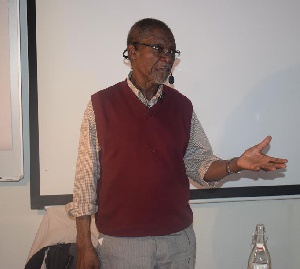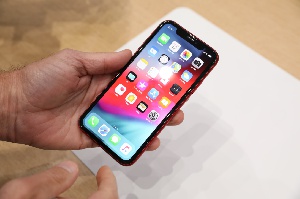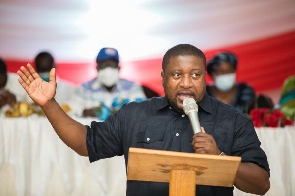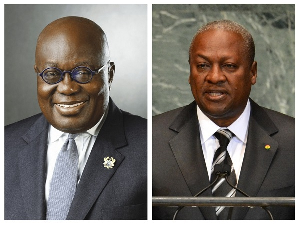He left the shores of Ghana in October 1957, taking a third class berth on a boat from the beach in James Town, Accra. It was headed for Marseilles from where he made his way to Hammersmith in London.
He had arrived in the U.K on a CMB scholarship from a newly independent Ghana to study to become a Building Engineer. This marked the beginning of a Ghanaian's long stay in Europe and an interesting life that still continues today.
Ransford Carboo ("Randy", as he is popularly known) regaled his enthralled audience of Ghanaians in Stockholm with interesting stories from his Gold Coast days and life in Europe in the late 50s and the 60s. And there was quite a good number of Ghanaians of all ages who came to listen to his story. Randy Carboo is among the first Ghanaians to have moved to, and reside in, Stockholm. That was in 1965.
The old man, who had carefully prepared his presentation, seized the attention of his listeners as he narrated his life’s history from Ghana before independence, through his studies in the UK, travails in Finland and final settlement in Stockholm.
Randy was born at Mangoase the Eastern Region of Ghana 25 years before our Independence. This means he was old enough to have witnessed first-hand many of the events that led to our independence – events many of us read about at school in the history books.
He was in Accra when the British led police shot dead three Gold Coast ex-servicemen, Sergeant Adjetey, Cpl Attipoe and Private Odartey Lamptey, who were marching to the Osu Castle to present a petition to the then Governor, Sir Gerald Creasy. Randy took part in the riots that resulted from the event.
The riots encouraged the anti-colonial movements to press the British government to institute a committee to investigate the killings and the consequent general disorder. The committee recommended self- government for the Gold Coast. Randy joined the CPP as a young man and sold the party’s newspaper, Evening News, on the streets of Accra.
As a boy, he had wanted to be a technician having always been fascinated by the sound of the locomotive engines that drove the trains in those days. (Here, Randy demonstrated the musical noise of the engines as they chugged along). But his father wanted him to be a tailor. He took correspondence courses and landed a job as a Drawing Office Assistant.

Randy left the shores of Ghana in October 1957 on a CMB scholarship to study in the UK. The boat took him from the beach in James Town taking several days to reach Marseilles from where he made his way to the UK. Air travel was not a common thing in those days. As a poor student, he was among those who travelled third class inside the depths of the boat. His final destination was Hammersmith in London and by 1961 he had successfully completed his studies to become a Building Engineer.
He then worked as a Production Controller and Bonus Calculator until 1965 when he left for Finland with the intention of studying Architecture. But his CMB scholarship did not entitle him to study in Finland. He then decided to move to Sweden where he met an Engineer who was helpful to him. He arrived in Sweden on a Friday and by Monday, he had secured himself a job. Those were the days. His British education came in handy as his job involved translating construction assignments from Swedish to English. His company easily secured a permanent permit for him to stay in Sweden. Those were the days, indeed!
In 1972, he found a new job and yet another in Huddinge, a commune outside Stockholm. Randy did not rest on his laurels and started studying as he was working. This saw him get qualifications in Economics at the Royal Institute of Technology, Stockholm, and Environmental Science and Public Health in Ostersund among other courses. In 1976 he became a qualified Public Health Inspector. In 1980, he built his own home in Gnesta, outside Stockholm, working on the construction with his own hands. It was also the year he joined the Swedish Home Guard.
In 1986, he left the Swedish Home Guards and had an intensive military training as a member of the Swedish standby forces for the United Nations. This took him to Lebanon as a Hygiene Officer for the Swedish UN forces in that country. Meanwhile, he had attained the rank of Captain in the Swedish UN Forces.
More foreign assignments followed. In 1991, he was with the Swedish Relief Unit to build a field hospital in Liberia by the request of the UN where his experiences as a Building Engineer and Public Health officer were brought to bear on his work. 1993 saw him working with the US forces in Somalia and in 1995 with UNPROFOR (United Nations Protection Force) in Bosnia.
When he retired from the Public Health Inspectorate in Södertälje Commune, he started his own company: CARBOO BYGGKONSULT, as a Certified Quality Assurance Supervisor and which he run for 18 years until his final retirement at the ripe age of 83 years. Through it all, he had married thrice, fathered eight children and now has 12 grandchildren and two great grandchildren. One of his children, Martin Carboo, was at hand during the presentation and worked the slides that showed pictures from various aspects of a long and fruitful life.
Question time brought interesting inquiries about Ghana before independence, his early days in Sweden (he had met only one Ghanaian when he arrived in Stockholm), and how he dealt with the racial problems in this country. There were many contributions from the audience on the last issue. He and his son shared their experiences in bringing up mixed children in this society. The discussions continued during the break and well after the presentation.
The function was put together by the Eunice Event Group in Stockholm.











